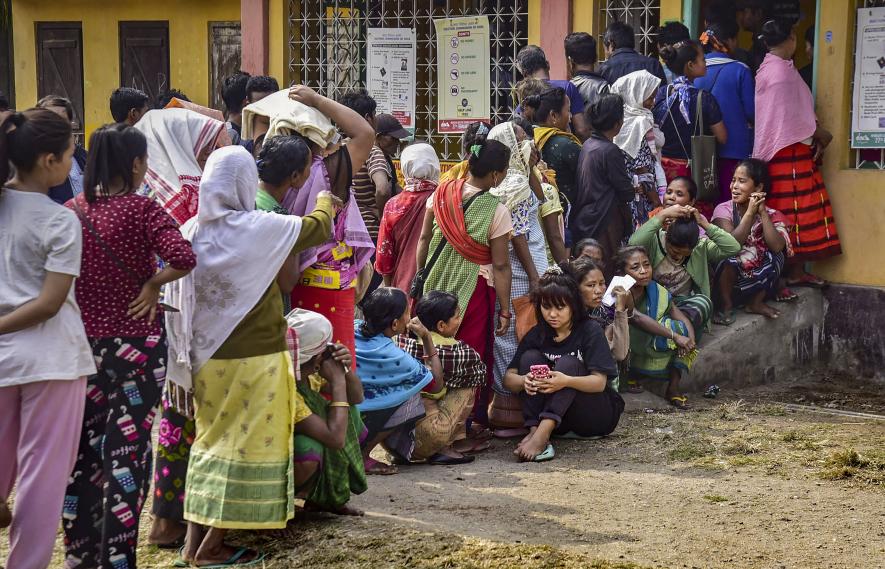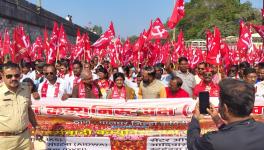NE Poll Results: Conrad Sangma’s Alliance With BJP Against People’s Mandate, Challenges Ahead for Tipra Motha

Voters wait in queues to cast their votes at a polling booth during the Meghalaya Assembly elections, in Ri Bhoi district, Monday, Feb. 27, 2023. Image Courtesy: PTI
It is now clear who is going to form the government in three northeastern states--Meghalaya, Tripura and Nagaland. The Bharatiya Janata Party (BJP) will remain in government in all of these states—with its solo performance in Tripura and Nagaland. At the same time, in Meghalaya, the BJP repeats the same saga as of the last election in 2018, which is remaining as part of the government despite a mandate on its repudiation.
It seems that political equations don’t take much time to set in, especially when election results are out. At least Conrad Sangma has proven that in Meghalaya. Even before formal declaration of the counting results was made, Conrad called Amit Shah in Delhi to seek support for re-securing his chief ministership. The sitting Meghalaya CM did not hesitate to approach the party, which stood apart from NPP (National People’s Party) – the party that Conrad heads – during the entire period of campaigning. This happened even though the BJP was quite attacking in its campaign against the NPP.
The question arises why Conrad was in such a hurry to approach the BJP when his party could have formed the government without their support. It is worth mentioning here that the BJP won only two seats this time, as it did in 2018. Whereas the other allies of the NPP, like the PDF (People’s Democratic Front) and UDP (United Democratic Party), performed much better than the BJP. The PDF won two seats while UDP won 11, and these numbers, combined with NPP’s tally of 26 seats, could have well crossed the 31 mark needed to prove majority in the Assembly. This means Conrad could have formed the government keeping the BJP far aside. But why and what are the implications?
During the election campaigns, the BJP was quite vocal in its corruption allegations against Conrad’s government. Amit Shah even went a step further and said in an election rally in the Tura region that the Meghalaya government is one of the most corrupt ones in the country. The BJP had promised to make Meghalaya corruption free as a prominent point in their campaigns. Were the allegations a signal of intimidation for Conrad? Notably, Conrad’s move follows the incident of Delhi Deputy CM Manish Sisodia’s arrest under corruption charges just a few days before the vote counting began in the northwestern state. Well, these are still speculations and allegations. But the bigger question is how the BJP could ally with the party that ran the Meghalaya government, which it termed as one of the most corrupt ones.
Roshmi Goswami, a Human Rights Activist and a political observer based in Shillong, speaking to NewsClick raised some serious concerns about the arrangement that Conrad Sangma has favoured. She said, “The election result clearly shows that the mandate was not at all in favour of the BJP. In fact, the people of Meghalaya rejected BJP even after the bigshots like the Prime minister himself, Amit Shah, Himanta Biswa Sarma, Sarbananda Sonowal etc. campaigned aggressively. The mandate, in fact, was clearly in favour of Conrad Sangma.”
Goswami continued, “If Conrad had any respect for the mandate, he would not have rushed to BJP or Amit Shah. The NPP and UDP combine clearly crossed the majority mark.” Goswami termed this act as a “total lack of political morality”.
“This has become a serious crisis for the Indian democracy today and a challenge. But I believe these enforced arrangements, however fruitful they may appear now, will boomerang in the long run,” she added.
Speculations about lobbyism inside the BJP are also floating. Some political observers in Meghalaya want to say that there are Himanta Biswa Sarma and Amit Shah’s lobby and Sarbananda Sonowal and Narendra Modi’s lobby. “Remember, PM Modi’s rally was cancelled by the Meghalaya government. Although it was said that the rally got cancelled due to construction works at the PA Sangma Stadium (Where PM Modi was supposed to hold a rally), it could have been well arranged,”—said a political activist from Shillong on the condition of anonymity.
Notably, it was Himanta Biswa Sarma who tweeted first about Conrad Sangma calling up Amit Shah to seek the BJP’s support. Reports were also there of Conrad Sangma meeting Himanta Biswa Sarma in Guwahati after the exit polls indicated a hung Assembly. Even without subscribing to the speculations, the questions persist.

Tripura: Challenges Ahead for Tipra Motha Party
It must be said that the Tipra Motha Party (TMP) has performed well in the Tripura election. Formed just two years back (February 2021), the TMP won 13 seats in its debut election, which is higher than the CPI(M) with 11 seats and Congress with three seats. The BJP, on the other hand, appeared to have weakened in comparison to 2018 and managed to win 32 seats, crossing the 31-mark narrowly to prove majority. Its ally IPFT (Indigenous People’s Front of Tripura) could bag only one seat.
The TMP jumped into the electoral race with its focal agenda of a separate Tipraland, for the indigenous tribes of Tripura. TMP chief Pradyot Bikram Manikya DebBarma was also approached by BJP leaders including Himanta Biswa Sarma for a pre-poll coalition. As the election neared, it became clearer that the TMP will perform well this time. Pradyot was clear in his demand that whoever gives a written commitment to greater Tipraland, he will go for a coalition. That did not happen and the left-congress alliance also was not considered for a pre-poll understanding, and the TMP went alone.
The election mandate implies two things—that the BJP has grown weaker in Tripura, and a tribal upsurge in a new form was welcomed by the tribal population. However, there are also concerns like division of votes amongst the opposition parties that could not succeed in dithering the BJP from getting the majority, even though marginally.
Further, despite a good performance, challenges for the TMP in its future journeys are multi-faceted. The first is to keep the MLAs intact in the party. Only time will tell how far the TMP can carry its demand of Tipraland to the final destination. The BJP’s ally IPFT also emerged in Tripura politics with similar demands, and now it witnesses a total rejection by the people. Pradyot Manikya’s statement after the declaration of the results also raised concerns when he said that his party will sit on the opposition but ‘independently’. This is a clear indication that the TMP will not share the opposition space in the Assembly. More so, Manikya said that his party will help the government whenever they need it.
On these issues, NewsClick spoke to Bikash Rai DebBarma, a language activist and artist based in Tripura. He is a keen political observer. When asked about the challenges of keeping the TMP’s MLAs intact, said, “The MLAs will be intact. Because people voted for them believing in their commitment to fighting for the indigenous tribes. People will not tolerate them if they betray this time.”
However, there is the living example of the AGP (Asom Gana Parishad) of Assam that came back to the BJP after separating at the height of the anti-CAA (Citizenship Amendment Act) movement. On this, DebBarma said, “This is like a labyrinth, given the whole political set-up. The TMP must overcome this.” He also said that after 1978, this is the first time when a local party has performed well in the elections without support from any national parties. “In 1978 it was TUJS (Tripura Ujapati Juba Samiti) and in 2023 it is TMP,” he said.
Jiten Choudhury, the state secretary of the CPI(M) [Communist Party of India (Marxist)], told NewsClick that the TMP is yet to pass its test. “It may not be a long-term formation as the others,” he said.
On the emergence of the TMP within a short period, Choudhury said, “It’s like a counter product of the BJP’s polarisation politics. The BJP promoted Bengali chauvinism and in contrast, fear grew among the tribal population. The TMP, especially Pradyot Manikya, actually capitalised on that.”
Choudhury said that all 13 seats where the TMP registered its victory belong to the 20 tribal reserved seats in Tripura. “But outside the reserved seats, the TMP raced in another 22 seats and could not win even a single one. Here, the vote division between the Left-Congress coalition and the TMP helped the BJP secure victory. Moreover, amongst the 20 reserved seats, seven went to the BJP and its ally. There the vote division helped the BJP as well,” the Left leader commented.
On the pre-poll coalition, Choudhury mentioned the BJP’s role. “First, the BJP tried to ally with the TMP, and when that did not happen, it pressurised TMP so that the coalition between it and the Left-Congress alliance did not occur. The election campaigns clearly indicate this,” Choudhury said. He added, “The BJP’s plan is to create division, whether it is Hindu-Muslim in Assam or Tribal-non tribal in Tripura”.
With only a few days remaining before the new chief ministers take in the northeastern states, the questions and aspirations of the people will sustain beyond the calculations and arrangements for proving the majority. Over time, many of these arrangements will change with new ones coming into being.
Get the latest reports & analysis with people's perspective on Protests, movements & deep analytical videos, discussions of the current affairs in your Telegram app. Subscribe to NewsClick's Telegram channel & get Real-Time updates on stories, as they get published on our website.
























